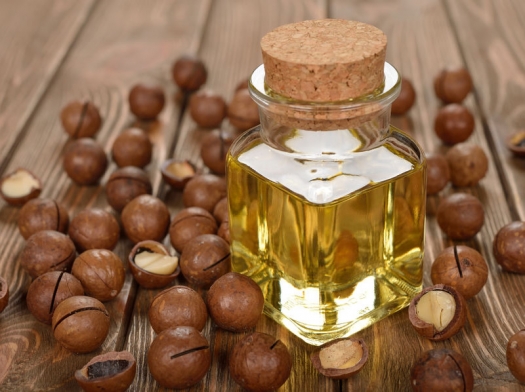I love olive oil and think it has extraordinary health benefits. However, I think all the emphasis on the benefits of a Mediterranean diet has given people the mistaken impression that olive oil is the only healthy oil available. Fortunately, eating healthfully doesn't ever have to mean being restricted, and that includes oils. I have been researching and trying the newest delicious, healthy culinary oil choices and want to share them with you. They are surprisingly plentiful in number!
From a health point of view...
The two main things to consider when choosing an oil are omega-6 and omega-3 essential fatty acid (EFA) content and saturation. Ideally, you should be eating the two EFAs in a ratio of about four omega-6s to one omega-3, but the ratio in the typical American diet is more like 30 to one. In a nutshell, that means you need to cut back on your omega-6 intake and start focusing on increasing your omega-3s.
Omega-3s have numerous impressive health benefits, including their ability to boost brain and heart health. Omega-6s are also important for health, but they're so abundant in modern food choices that most people overdo all but one critical kind: gamma linolenic acid (GLA), which has been shown to alleviate depression, balance blood sugar, and ease the pain associated with such conditions as rheumatoid arthritis.
For the best health benefits, be sure to choose only cold-pressed oils, which are processed in such a way that their nutritional value is not destroyed.
From a cook's point of view...
There are two reasons to use oil. One is as a cooking medium, and the other is as a seasoning. Good cooking oils have a high smoke point – the temperature beyond which the oil starts to smoke and discolor. At that temperature, the oil's nutritional benefits are lost, and unhealthy, toxic, even carcinogenic byproducts start forming (not to mention it tastes awful). So, most oils with a low smoke point are used for flavor, not for cooking, and they're used at room temperature or only gently warmed.
In addition, cooking oils should have neutral or subtle flavors, while seasoning oils usually have nutty or fruity flavors that range from subtle to strong.
From a shopper's point of view...
Make sure you check the expiration date on the label. Oils tend to go rancid with time, some quicker than others. Store all oils in a cool, dark place, and when in doubt, just put them in the refrigerator.
Experiment with New Oils
While I encourage you to continue using olive oil, I also suggest that you spice up your kitchen – and taste buds – with some of the lesser known healthy oils on the market. You can find the following oils online or at health food stores. As a reference point, olive oil has a smoke point of 375 degrees and a pretty strong flavor. Its primary health benefits come from its high monounsaturated fat content (about 75 percent). Bon appétit!
- Macadamia nut oil contains a very respectable 80 to 90 percent monounsaturated fat. And it has a nutty aroma and a lovely, delicate taste that, unlike olive oil, can work for both sweet and savory dishes. Its moderate smoke point (about 390 degrees) is equivalent to that of organic olive oil. You can cook with it, but only up to medium heat. I like the Amarante brand.
- Avocado oil's monounsaturated fatty acid content is equivalent to that of olive oil. It has a subtle nutty flavor that can work for both sweet and savory dishes. And, it has the highest smoke point I know of – 520 degrees – which makes it a wonderful oil with which to cook. It's also delicious in salads and drizzled over vegetables, eggs, or wheat-free pasta.
- Hemp seed oil is a rich natural source of omega-3s and also contains a small amount of omega-6 GLA. It is a good choice for salad dressings, homemade mayonnaise, and as a vegetable or bread dipper. It can be used for cooking at low temperatures, but its smoke point (330 degrees) is too low for serious cooking.
- Black currant seed oil is one of the richest natural sources of omega-6 GLA. Because it has a pleasant taste, I suggest using a spoonful or two as a salad dressing. However, it should not be heated. You can buy this oil in 1,000 mg capsules, cut them open, and drizzle the contents onto your food.
- Green tea seed oil should be in every kitchen. It has an 81 percent monounsaturated fat content, a mildly sweet taste, and a high 485-degree smoke point. And, amazingly for an oil, animal studies show that it suppresses fat cell differentiation and lowers cholesterol for help in normalizing body weight (November 2008, European Journal of Physiology). I prefer the Emerald Harvest brand.
- Pumpkin seed oil is one of my flavor favorites. Used in the Baltic regions as a treatment for irritable bowel syndrome, this thick, dark green, nutty-tasting oil is rich in omega-3s, second only to flaxseed oil. It makes a delicious salad dressing or veggie dipper, and it's even good over sweet foods like sliced mango. It's also a rich source of phytoestrogens and has cardiovascular benefits. It can only tolerate gentle heat, so I would advise against cooking with it.
- Marionberry, boysenberry, red raspberry, and blueberry seed oils all have a great omega-6 to omega-3 ratio: about 4 to 1 (February 2005, Journal of Agricultural and Food Chemistry). They're also bursting with phytonutrients, including the eye-protecting carotenoids zeaxanthin and lutein, anti-inflammatory phenols, and antioxidants. With their fruity flavor, they're wonderful for salad dressings and as dessert drizzlers. Because of their low smoke points, they should never be used for cooking. You can find these oils at gourmet grocery stores.
- Argan oil comes from the argan tree, which is indigenous to Morocco. It has about 45 percent monounsaturated fats and a delicate, nutty flavor similar to that of pumpkin seed oil. I advise against cooking with it, due to its low smoke point. Instead, use it as a salad dressing or dipper. Studies show that regular use is associated with lower LDL cholesterol and significant overall protection against inflammation, cancer, and cardiovascular disease (October 2004, Clinical Nutrition; July 2006, Pharmacological Research). Argan oil is produced almost exclusively by indigenous Berber women in fair-trade cooperatives. You can buy it at Zamouri Spices.



